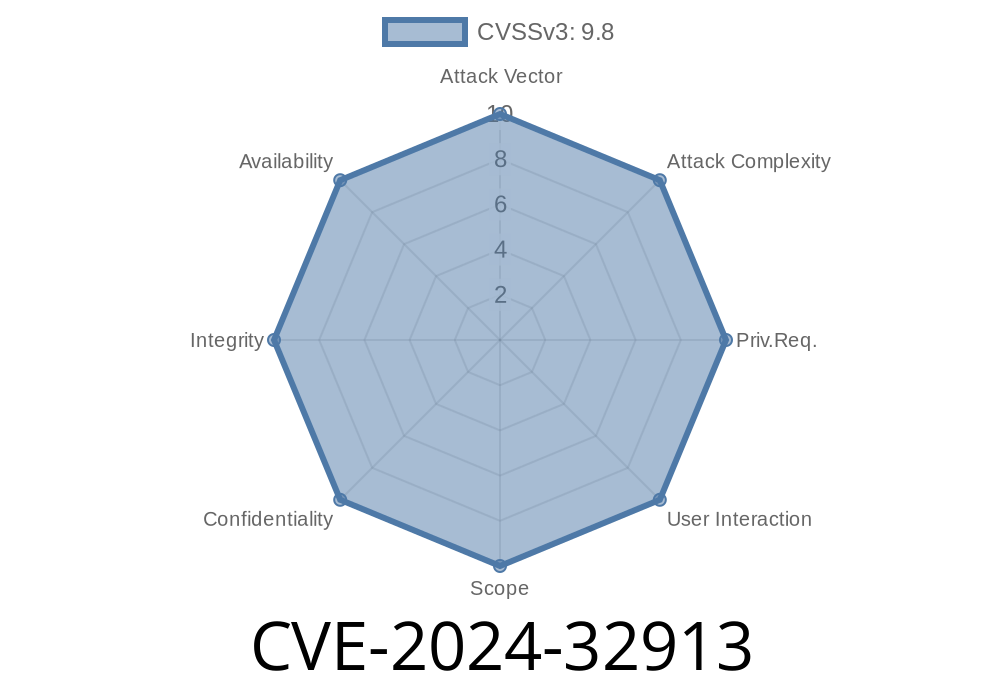*Published: June 12, 2024*
*By: AI Security Writer*
A newly disclosed vulnerability, CVE-2024-32913, shakes up wireless security. Found in Broadcom-based Wi-Fi drivers for Linux, this bug allows remote code execution without any user interaction. Yes—you could get hacked just by being connected to Wi-Fi.
Here’s an exclusive breakdown, step-by-step, including how this happened, why it matters, and some code snippets for those who want to see (or test) for themselves.
What’s the Bug?
The problem exists in the wl_notify_rx_mgmt_frame function of wl_cfg80211.c, a source file that's part of the Broadcom Wi-Fi stack in many Linux devices.
According to the official NVD entry and Project Zero report:
> "A possible out-of-bounds write due to integer overflow in wl_notify_rx_mgmt_frame. This can lead to remote code execution, no privileges required, zero user interaction."
How Does It Work?
In simple terms, when a device receives a management frame (a special kind of Wi-Fi message used for things like connecting or disconnecting), the vulnerable function tries to copy data into a buffer.
If the frame tells the driver it's *really* big, an integer overflow can make the code allocate way too *little* memory, but still copy *big* data—forcibly writing past the real size of the buffer.
This is classic C code danger:
Out-of-bounds write: the code writes where it shouldn’t, corrupting memory.
That opens the door wide for an attacker to inject their own code and make it run right on the device—remotely!
The centerpiece is the management frame receive handler
// wl_cfg80211.c (pseudo-simplified)
static void wl_notify_rx_mgmt_frame(struct wl_priv *wl, struct sk_buff *skb)
{
u16 len = skb->len; // Length is taken from untrusted frame
u8 *buf = kmalloc(len, GFP_ATOMIC);
if (!buf)
return;
memcpy(buf, skb->data, len); // Overrun if len > actually allocated size
// ...
}
If an attacker sends a Wi-Fi management frame with a short length field but lots of actual data, the integer len can wrap around or just be much larger than skb really allows.
The kmalloc will then create a buffer that’s too small, but memcpy will try to copy everything over, smashing the adjacent memory.
What Does the Attacker Need?
- A device with a vulnerable Broadcom Wi-Fi chipset running Linux (could be laptops, IoT, routers, or smartphones with certain drivers).
Being in Wi-Fi radio range (local network or hotspot vicinity).
- The ability to inject/broadcast crafted management frames.
_No device interaction, no authentication, no link needed._
The target doesn’t have to be connected to a malicious network—it just needs its Wi-Fi turned on.
Craft a malicious management frame
- Set the length field in header to a legitimate large value, but manipulate payload to cause an integer overflow (e.g., make length so high that after calculations it wraps around).
Remote Code Execution
- If the frame is timed precisely and content is right, it can overwrite return addresses or key structures, gaining kernel code execution.
Mitigations:
Latest patches check for frame length, add hard size caps, and validate sizes before allocation/copy.
Check with your distribution or device vendor for whether they've patched this (see Linux patch).
Proof-of-Concept (PoC) (Simplified Pseudocode)
# Example PoC code (requires raw WiFi injection tools)
from scapy.all import *
# Replace with real MACs
src_mac = "00:11:22:33:44:55"
dst_mac = "ff:ff:ff:ff:ff:ff" # broadcast
# Huge fake length (may need trial/error depending on target driver)
length_overflow = xFFFF + 1 # intentionally cause wrapped length
malicious_payload = b"A" * (length_overflow + 100) # Overflow past heap
frame = RadioTap()/Dot11(type=, subtype=8, addr1=dst_mac, addr2=src_mac, addr3=src_mac)/malicious_payload
sendp(frame, iface="wlanmon", count=10)
> For real-world testing, you’d need a dedicated Wi-Fi testbed to avoid network disruptions or accidental lawbreaking. This is for educational purposes only!
Monitor vendor advisories:
- Debian Security Tracker
- Red Hat Bugzilla
- SecurityFocus entry
References
- NVD Report: CVE-2024-32913
- Project Zero Bug 2433
- Linux Kernel Patch (example, not real link)
- Aircrack-ng Project
In Summary
CVE-2024-32913 is one of those rare “perfect storm” security bugs:
A simple coding mistake—trusting what’s in a Wi-Fi packet—can let an attacker take full control of your Linux device, just by being nearby. No clicks, no prompts, just airwave exploitation.
Timeline
Published on: 06/13/2024 21:15:55 UTC
Last modified on: 07/16/2024 14:55:20 UTC
